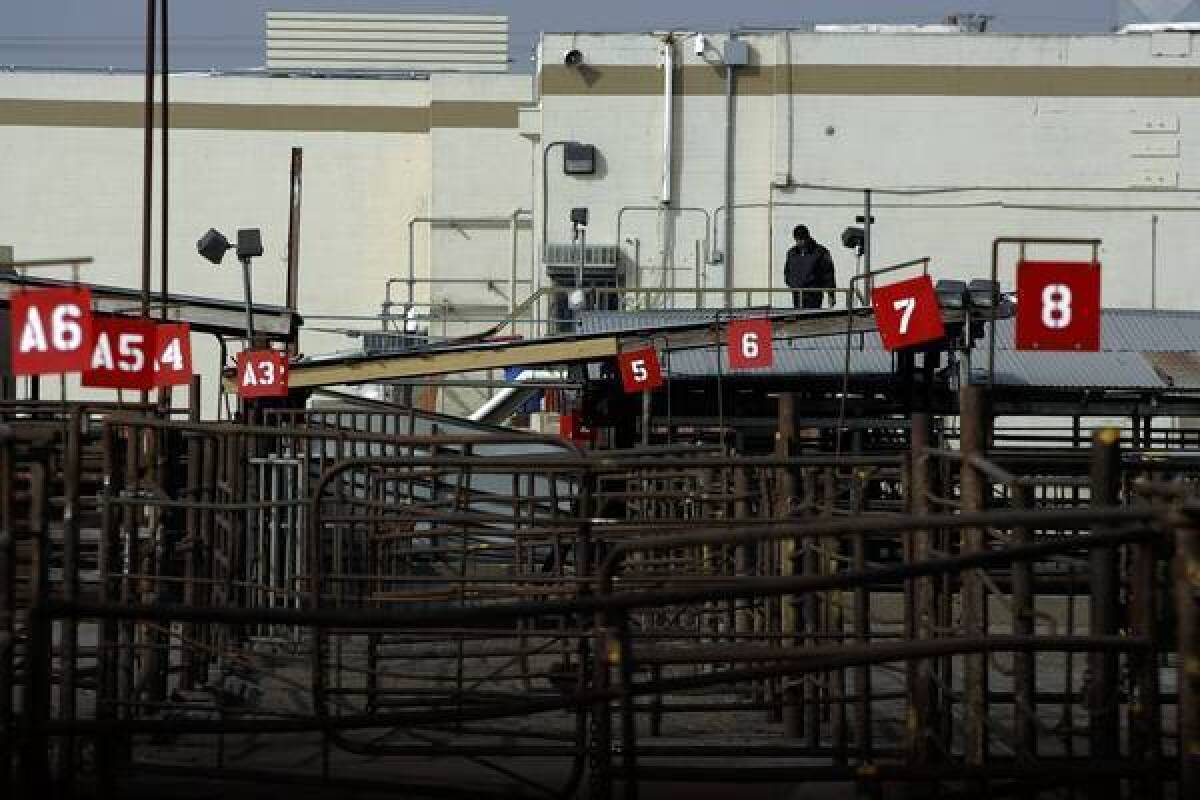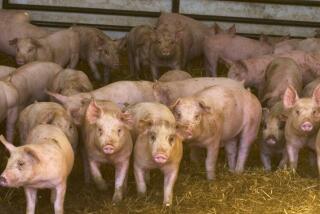Chino slaughterhouse to pay $300,000 in settlement

The owners of a Chino slaughterhouse that was at the center of the largest beef recall in U.S. history four years ago have agreed to pay more than $300,000 to settle a lawsuit that alleged fraud against the U.S. government.
Donald Hallmark Sr. and Donald Hallmark Jr. were two of nine defendants in a federal False Claims Act suit brought by the Humane Society of the United States. As part of the settlement, the Hallmarks also agreed to a nominal $497-million judgment against the now-defunct Hallmark Meat Packing Co., which will not be collected because the company is bankrupt.
The suit stems from a 2008 video released by the Humane Society that was surreptitiously shot by an activist posing as a worker. It showed employees at the slaughterhouse using forklifts, electric prods and high-pressure water hoses to force cattle to their feet.
The video sparked outrage at the animals’ treatment and led to food safety concerns because the Hallmark plant was the second-largest supplier of ground beef to the National School Lunch Program. Animals that are unable to walk on their own, known as “downer” or “non-ambulatory” cattle, are banned from the human food supply out of concern that they may be infected with diseases such as bovine spongiform encephalopathy, also known as mad cow disease.
At the time, the U.S. Department of Agriculture recalled 143 million pounds of beef processed at the plant over two years, about a third of which had gone to schools. The government paid an estimated $150 million for beef produced between 2006 and 2008 that was later subject to the recall.
The Humane Society sued the plant and its owners under a federal law that allows private citizens with knowledge of fraud against the U.S. government to file suit to recover penalties. The group alleged that the Hallmarks defrauded the government through misrepresentation on their federal school lunch program contracts.
The U.S. Department of Justice intervened in the suit, alleging that the company falsely represented itself as adhering to federal regulations on humane treatment of animals, and had improperly slaughtered “downer” cows for meat “at least three times every 30 days.”
Federal officials additionally alleged that the company concealed the fact that a part owner of the operation, Aaron Magidow, had two felony convictions that would have precluded Hallmark Meat Packing from obtaining school lunch contracts. Magidow, who died in 2006, had been convicted of bribing federal meat inspectors and for participating in a fraudulent meat purchasing scheme, Department of Justice attorneys wrote in court papers.
Magidow stated under oath in a 1999 deposition on another matter involving the company that because of the convictions, in 1974 and 1983, “I can’t have an inspection number in my name,” according to the papers.
The Hallmarks’ attorney, Donald Sieveke, declined to comment.
Eddie A. Woods, an attorney representing three remaining defendants, including Magidow’s estate and his widow, said in an emailed statement that his clients had no knowledge of the alleged abuses at the Chino facility and were not bound by the settlement announced Friday.
“We believe the allegations brought by the U.S. Department of Justice and the Humane Society of the United States against our clients are baseless and politically motivated, and we will continue to vigorously defend against them,” he said.
According to the release, the Hallmarks will pay $316,802 to the U.S. Department of Justice over five years, and cooperate in the suit against the remaining defendants. The Humane Society said in its news release that the group will also receive a “small portion” of the settlement for bringing the case.
More to Read
Sign up for Essential California
The most important California stories and recommendations in your inbox every morning.
You may occasionally receive promotional content from the Los Angeles Times.











